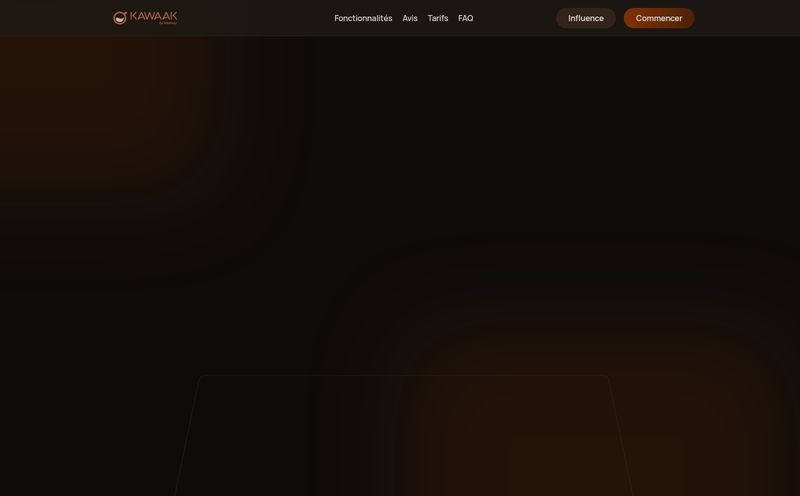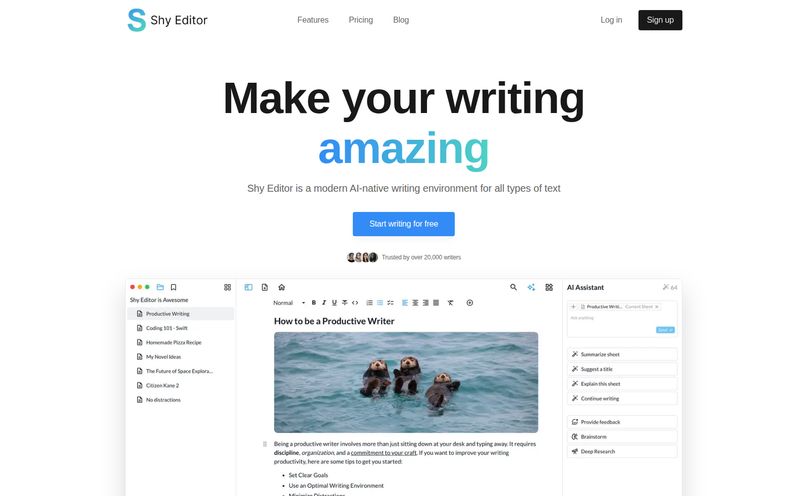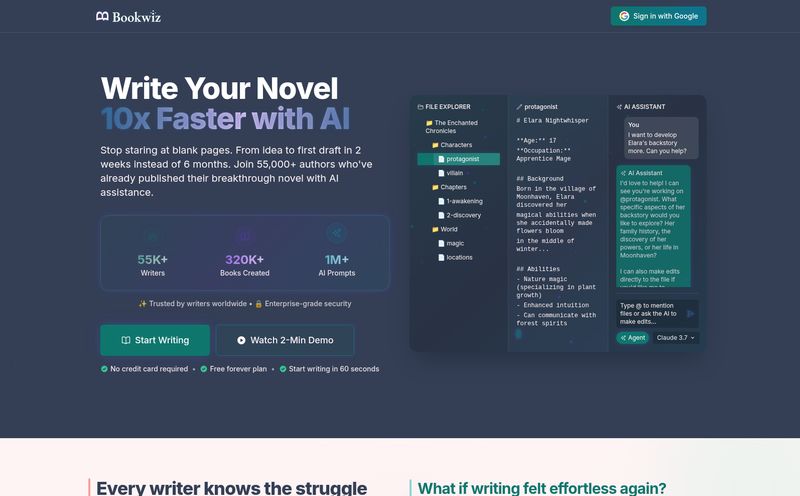There's a certain kind of quiet terror that every creative person knows. It's the deafening silence of a blank page. For songwriters, it’s the empty staff, the blinking cursor in a new doc, the guitar that suddenly feels like a foreign object in your hands. We’ve all been there, staring into the abyss and the abyss just stares right back, offering nothing. It's what we call writer's block, but that term feels too simple. It’s more like a creative fog.
So, when a tool like LyriTunes pops onto my radar, my inner SEO-nerd and my long-suffering inner musician both sit up and pay attention. An AI that writes lyrics for you? Based on just a few keywords? Part of me scoffs. Blasphemy! The other, more pragmatic part of me leans in closer. Could this be the digital defibrillator my creativity needs on a slow Tuesday afternoon?
Let's find out.
First Off, What is LyriTunes Exactly?
Before we get all philosophical, let's break it down. LyriTunes isn't some sentient AI poet living in the cloud (as far as I know). It's a clever app designed to be a starting point. The concept is refreshingly simple: you feed it a short description or a handful of keywords—think "rainy monday morning, lost love, coffee shop"—and its AI engine gets to work, churning out original lyrics that try to capture that vibe.
It’s not trying to be Bob Dylan. It's trying to be your brainstorming partner. The one who never gets tired, never says your idea is dumb, and is available 24/7. That alone has its merits, right?
My First Spin with this AI Muse
Alright, time to take it for a test drive. The interface, from what I've seen, is almost comically minimalist. There's no clutter, no million-and-one options to get lost in. You type in your prompt. You hit go. A little progress bar that says "Initialising..." does its thing.
And you wait. For me, that little moment of waiting is filled with a weird mix of skepticism and hope. Is it going to spit out gold, or just a jumble of nonsense that sounds like a refrigerator magnet poetry kit had a seizure?

Visit LyriTunes
I decided to give it a classic theme: "Driving down a dusty road, leaving a small town behind, feeling hopeful but scared."
What it came back with... well, it wasn't a Grammy-winner. But it wasn't terrible either. It gave me a verse, a chorus, and a bridge. Some lines were a bit cliché ("The rearview mirror shows the life I knew"), but then there was a gem tucked in there I hadn't considered. It used the phrase "sun-cracked dashboard maps" which I actually... kinda loved. And that’s the point, isn't it? It gave me a spark. A single line I could build on.
The Good, The Bad, and The AI-Generated
Like any tool, especially an AI one, LyriTunes has its highs and its lows. It’s not magic, it’s an algorithm. And it's important to know what you're getting into.
The Things I Genuinely Liked
The speed is the first thing that hits you. It’s fast. Faster than brewing a cup of tea. For anyone on a deadline or just impatient, this is a massive plus. The sheer ease of use is another big win. There is literally no learning curve. If you can type a search into Google, you can use LyriTunes. This is a great tool for getting you started, but dont expect it to write the next big hit on its own. It's the ultimate creative icebreaker, perfect for those moments when your brain just refuses to get in gear. It throws ideas at the wall so you don't have to.
Where It Gets a Little... Robotic
Here's the flip side. The quality is entirely dependent on your input. The old programmer's mantra, "garbage in, garbage out," applies here in a big way. Vague keywords will get you vague, generic lyrics. You have to be evocative in your prompt to get anything remotely interesting back. And even then, the AI can sometimes miss the mark on emotional depth. It can understand "sad," but it can't understand the specific, gut-wrenching ache of a particular memory. It's assembling words based on patterns, not feeling the weight of them. You’ll probably need to hit the 'generate' button a few times to find a version you really connect with.
So Who Is This AI Lyricist Really For?
After playing around with it, I've got a few ideas. I don't see professional songwriters for major labels ditching their process for this. But that's not the point.
- The Hobbyist Songwriter: This is a fantastic tool for someone who loves to write songs but gets stuck. It's a no-pressure way to get ideas flowing.
- Content Creators & Marketers: Need a quick, original jingle for a YouTube video or a podcast intro? Boom. LyriTunes can spit out something usable in seconds, saving you from copyright strikes or expensive stock music fees. From a traffic generation perspective, unique audio content can be a real SEO boost.
- Musicians with Writer's Block: For the seasoned pro who's just hit a wall, this could be the weird, unexpected prompt that knocks something loose. Think of it less as a writer and more as a set of digital tarot cards for creativity.
It's a utility player. A helpful assistant. Not the star of the show.
The Big Question: What's The Price?
Here's where things get a bit mysterious. I couldn't find a clear pricing page for LyriTunes. This could mean a few things. It might be in a free beta phase, gathering user data before they roll out a paid plan. Or it could be operating on a freemium model where you get a few generations for free and then have to pay. Or maybe the pricing is just well-hidden. For now, it seems to be free to try, which is great. But I'd keep an eye out for a subscription model to pop up in the future. It's the way of the web.
Frequently Asked Questions about LyriTunes
How does LyriTunes actually generate the lyrics?
It uses a type of artificial intelligence called a large language model (LLM). It's been trained on a massive amount of text from the internet, including songs, poems, and other creative writing. When you give it a prompt, it predicts the most likely sequence of words to follow, based on the patterns it learned, to create something that looks and sounds like lyrics.
Can I use the lyrics from LyriTunes in my own songs commercially?
This is the million-dollar question with AI-generated content. The legal landscape is still a bit of a wild west. My advice? Always, always check the platform's Terms of Service. Some platforms grant you full commercial rights, while others may have restrictions. To be safe, I’d recommend using the generated lyrics as a starting point and heavily editing them to make them your own.
Is LyriTunes better than other AI lyric generators out there?
"Better" is subjective. LyriTunes' strength seems to be its simplicity and speed. Other tools might offer more complex controls, like specifying rhyme schemes (AABB, ABAB) or syllable counts. It really depends on your needs. If you want a quick jolt of inspiration, LyriTunes is excellent. If you need fine-tuned control, you might want to shop around.
What's the best way to get good results from LyriTunes?
Be specific and evocative with your input! Don't just type "love song." Try "first love, summer carnival, ferris wheel at sunset." The more sensory details and emotional context you provide the AI, the more it has to work with, leading to more interesting and unique results.
Is LyriTunes completely free to use?
As of my last check, it appears to be free to use, but there isn't clear information on a dedicated pricing page. It's possible it's in a beta testing phase or operates on a freemium model. It's best to enjoy it for free while you can, but be prepared that this might change.
Final Thoughts: A Muse or Just a Machine?
So, is LyriTunes the future of songwriting? No. Of course not. It lacks a heart. It lacks lived experience. It will never know the feeling of a real heartbreak or the thrill of a real first kiss. And that's okay. It's not supposed to.
What it is, is a fascinating and genuinely useful tool. It's a ghost in the machine that can whisper a few lines in your ear when you need them most. It's a way to kickstart your own, very human, creativity. For me, that's more than enough. It won't write your masterpiece for you, but it might just help you find the first word. And sometimes, that’s all you need.
References and Sources
- For a deeper academic look at AI and creativity, check out research like Ahmed Elgammal's work on AI art at Rutgers' Art & AI Lab.



